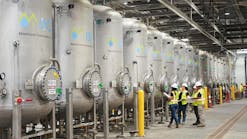RIVERSIDE, CA, April 24, 2015 -- Researchers at the University of California in Riverside (UCR) and the Hebrew University of Jerusalem in Israel have partnered to launch a two-year study of the use of treated wastewater in agriculture, a study they hope will lead to viable and cost-effective regional water reuse policies.
Kurt Schwabe, associate professor of environmental economics and policy and the project's principal investigator, explained that the team will review existing research on using treated wastewater to improve the reliability of local water supplies; study the impact of treated wastewater on crop yields; and evaluate the efficacy and cost-effectiveness of new technologies for using treated wastewater on landscaping and agriculture.
The project, "Enhanced Resilience of Local Agricultural Water Supplies through Reuse of Municipal and Agricultural Water: A Dynamic Economic Analysis," will initially be funded with a seed grant of approximately $300,000 from the U.S. Department of Agriculture's (USDA) National Institute of Food and Agriculture-Binational Agricultural Research and Development Fund partnership with Israel.
"The long-term goal is to determine the most cost-effective approach to utilizing treated wastewater with an eye toward water supply reliability and maintaining water quality standards," Schwabe explained. "Given the integral role wastewater reuse will play in an agency's water supply portfolio, a clearer understanding of reuse possibilities and their implications on agency costs can be helpful. Yet to identify cost-effective solutions to these problems requires an interdisciplinary approach. Collaborating with researchers in engineering, economics and soil science is a much more effective strategy to solve issues than a piecemeal or siloed approach."
Water stress and scarcity issues affect communities across the U.S., including in California, which is experiencing a historic drought, Schwabe said. Even places such as Atlanta, Ga., which was 80 days away from running out of water in 2009, could benefit from such an analysis.
Although many communities and water agencies are contemplating the expansion or introduction of treated wastewater for outdoor uses, "there has been no holistic approach to bringing agriculture into the picture," Schwabe said. "Israel has been using treated municipal wastewater in agricultural environments for 15 to 20 years. If we want to understand the relationship between treated wastewater and crop yield and possible health issues, this is the place to go."
Approximately half of agricultural land in Israel uses treated wastewater, and farmers there are beginning to see decreasing crop yields and excess concentrations of sodium in fruits and vegetables on fields irrigated with wastewater, said David Jassby, assistant professor of environmental and chemical engineering and co-principal investigator on the project. Treated wastewater typically is saltier than drinking water.
Jassby will study various wastewater treatment methods with an emphasis on the water-quality parameters resulting from different technologies. These parameters will be matched to the water-quality requirements of certain crops, with the goal of identifying costs of various treatment methods related to crop yield and quality. For example, grapes need certain nutrients and fertilizers. Avocados need something different. How can wastewater treatment processes be engineered to provide water for specific crops?
"Our hope is that wastewater utilities can engineer their treatment trains to meet the demands of farmers so we can better reuse wastewater in a way that is cost-effective, rather than send it to the ocean," Jassby said. "In the long term, we hope we will be able to optimize wastewater treatment processes so they are better matched to the agricultural end uses of the water. To the best of our knowledge, no one is looking at this kind of model."
Schwabe said the UCR half of the team will work with local agencies, including the USDA Salinity Lab, West Riverside County Agriculture Coalition, Rancho California Water District, Orange County Water District, and Eastern Municipal Water District, to conduct experiments and develop cost-effective strategies tailored to the needs of individual water districts.
All information was found at UCR's website and can be accessed here.
###


